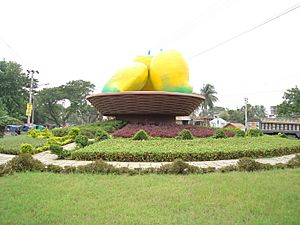Fazli (mango) facts for kids
Quick facts for kids Mangifera 'Fazli' |
|
|---|---|

A roundabout depicting the Fazli Mango in Rajshahi
|
|
| Genus | Mangifera |
| Species | Mangifera indica |
| Cultivar | 'Fazli' |
The Fazli mango is a special type of mango that grows mainly in Bangladesh and the Indian state of West Bengal. It's known for being a late bloomer, meaning it ripens and becomes available after many other mango types.
Fazli mangoes are quite big! Each one can weigh up to a whole kilogram, which is like a big bag of sugar. People often use these large, tasty mangoes to make delicious jams and pickles, especially in the food of the Indian subcontinent.
Contents
What Makes Fazli Mangoes Special?
Fazli mangoes are a popular fruit because of their size and flavor. They are one of the last mango varieties to ripen each season. This means you can enjoy them when other mangoes are no longer available.
How Are Fazli Mangoes Used?
These mangoes are very versatile in the kitchen. They are perfect for making sweet jams that you can spread on toast. They are also used to create tangy pickles, which are a common side dish in many meals. Because they are so large, they provide a lot of fruit for these uses.
Where Do Fazli Mangoes Grow?
The main places where Fazli mangoes are grown are Bangladesh and the Indian state of West Bengal. In Bangladesh, the Rajshahi Division is especially famous for growing a lot of Fazli mangoes.
These mangoes are important for trade. They are sold in local markets and are also sent to other countries. This makes them a valuable crop for the farmers who grow them.
Special Status: Geographical Indication
Sometimes, a product gets a special label called a "Geographical Indication" (GI). This label shows that the product comes from a specific place and has qualities linked to that area. It's like a special badge of honor for products from a certain region.
In 2009, India applied for a GI tag for the Fazli mango. Later, in 2021, Bangladesh also received GI status for the Fazli mango as a product of Bangladesh. This means both countries are recognized for growing this unique fruit.
 | Lonnie Johnson |
 | Granville Woods |
 | Lewis Howard Latimer |
 | James West |

